- Home
- Lisa Wingate
Drenched in Light
Drenched in Light Read online
Table of Contents
Title Page
Copyright Page
Dedication
Acknowledgements
Chapter 1
Chapter 2
Chapter 3
Chapter 4
Chapter 5
Chapter 6
Chapter 7
Chapter 8
Chapter 9
Chapter 10
Chapter 11
Chapter 12
Chapter 13
Chapter 14
Chapter 15
Chapter 16
Chapter 17
Chapter 18
Chapter 19
Chapter 20
Chapter 21
Chapter 22
Chapter 23
Chapter 24
Chapter 25
Chapter 26
Praise for Lisa Wingate’s Accent novels, the Tending Roses series
The Language of Sycamores
“Heartfelt, honest, and entirely entertaining…this poignant story will touch your heart from the first page to the last.”—Kristin Hannah
“Wingate’s smoothly flowing prose fills the pages with emotional drama.”
—Romantic Times (Top Pick)
Good Hope Road
“A novel bursting with joy amidst crisis: Small-town life is painted with scope and detail in the capable hands of a writer who understands longing, grief, and the landscape of a woman’s heart.”
—Adrian Trigiani, author of the Big Stone Gap trilogy
“Wingate has written a genuinely heartwarming story about how a sense of possibility can be awakened in the aftermath of a tragedy to bring a community together and demonstrate the true American spirit.”
—Booklist
Written by today’s freshest new talents and selected by New American Library, NAL Accent novels touch on subjects close to a woman’s heart, from friendship to family to finding our place in the world. The Conversation Guides included in each book are intended to enrich the individual reading experience, as well as encourage us to explore these topics together—because books, and life, are meant for sharing. Visit us online at www.penguin.com
Tending Roses
“A story at once gentle and powerful about the very old and the very young, and about the young woman who loves them all. Richly emotional and spiritual, Tending Roses affected me from the first page.”
—Luanne Rice, New York Times bestselling author of Silver Bells
“You can’t put it down without…taking a good look at your own life and how misplaced priorities might have led to missed opportunities. Tending Roses is an excellent read for any season, a celebration of the power of love.”—El Paso Times
Praise for Lisa Wingate’s Texas Hill Country series
Over the Moon at the Big Lizard Diner
“A beautifully crafted and insightfully drawn page-turner…this is storytelling at its best….Wingate delivers an insightful, heartfelt, and sometimes crazy novel of romance, redemption, and personal change. A journey you simply must not miss.”
—Julie Cannon, author of the Homegrown Series and Those Pearly Gates
“A warmhearted tale of love and longing, grits and cowboys, horse psychology and dinosaur tracks.”
—Claire Cook, author of Multiple Choice and Must Love Dogs
“A feisty, flirtatious, home-grown Texas tale.”
—Dixie Cash, author of My Heart May Be Broken, But My Hair Still Looks Great
Lone Star Café
“A charmingly nostalgic treat….Wingate handles the book’s strong spiritual element deftly, creating a novel that is sweetly inspirational but not saccharine.”—Publishers Weekly
“A beautifully written, heartwarming tale about finding love where you least expect it.”—Barbara Freethy
“Leaves you feeling like you’ve danced the two-step across Texas.”
—Jodi Thomas
“A remarkably talented and innovative writer, with a real feel for human emotion”—Linda Lael Miller
Texas Cooking
“A delightful love story as heartwarming and vivid as its setting in the beautiful Texas hill country.”—Janice Woods Windle
“Texas Cooking… will have readers drooling for the next installment … [a] beautifully written mix of comedy, drama, cooking, and journalism.”
—Dallas Morning News
“Takes the reader on a delightful journey into the most secret places of every woman’s heart.”—Catherine Anderson
“The story is a treasure. You will be swept along, refreshed, and amused….Give yourself a treat and read this tender, unusual story.”
—Dorothy Garlock
NOVELS BY LISA WINGATE
THE TENDING ROSES SERIES
Tending Roses
Good Hope Road
The Language of Sycamores
THE TEXAS HILL COUNTRY SERIES
Texas Cooking
Lone Star Café
Over the Moon at the Big Lizard Diner
NAL Accent
Published by New American Library, a division of Penguin Group (USA) Inc.,
375 Hudson Street, New York, New York 10014, USA •
Penguin Group (Canada), 90 Eglinton Avenue East, Suite 700, Toronto, Ontario M4P 2Y3, Canada (a division of Pearson Penguin Canada Inc.) • Penguin Books Ltd., 80 Strand,
London WC2R 0RL, England • Penguin Ireland, 25 St. Stephen’s Green, Dublin 2, Ireland (a division of Penguin Books Ltd.) • Penguin Group (Australia), 250 Camberwell Road, Camberwell,
Victoria 3124, Australia (a division of Pearson Australia Group Pty. Ltd.) •
Penguin Books India Pvt. Ltd., 11 Community Centre, Panchsheel Park, New Delhi—110 017, India
• Penguin Group (NZ), cnr Airborne and Rosedale Roads, Albany, Auckland 1310, New Zealand (a division of Pearson New Zealand Ltd.) • Penguin Books (South Africa) (Pty.) Ltd.,
24 Sturdee Avenue, Rosebank, Johannesburg 2196, South Africa
Penguin Books Ltd., Registered Offices:
80 Strand, London WC2R 0RL, England
First published by NAL Accent, an imprint of New American Library, a division of Penguin Group (USA) Inc.
First Printing, July
Copyright © Wingate Media, LLC, 2006 Conversation Guide copyright © Penguin Group (USA) Inc., 2006
All rights reserved
Fiction for the Way We Live REGISTERED TRADEMARK—MARCA REGISTRADA
LIBRARY OF CONGRESS CATALOGING-IN-PUBLICATIONDATA TK
eISBN : 978-1-101-09775-5
Without limiting the rights under copyright reserved above, no part of this publication may be reproduced, stored in or introduced into a retrieval system, or transmitted, in any form, or by any means (electronic, mechanical, photocopying, recording, or otherwise), without the prior written permission of both the copyright owner and the above publisher of this book.
PUBLISHER’S NOTE
This is a work of fiction. Names, characters, places, and incidents either are the product of the author’s imagination or are used fictitiously, and any resemblance to actual persons, living or dead, business establishments, events, or locales is entirely coincidental.
The publisher does not have any control over and does not assume any responsibility for author or third-party Web sites or their content.
The scanning, uploading, and distribution of this book via the Internet or via any other means without the permission of the publisher is illegal and punishable by law. Please purchase only authorized electronic editions, and do not participate in or encourage electronic piracy of copyrighted materials. Your support of the author’s rights is appreciated.
http://us.penguingroup.com
To my mom
For letting me drop ou
t of piano lessons
And ballet school,
For saying yes when I wanted to try gymnastics,
Then sitting through countless hours of lessons and competitions
To my dad
For letting me have a pony,
Which led to years of horse shows, here, there, and everywhere
You never pushed
Or criticized, or seemed disappointed
You gave me the dreams of my childhood
While you cheered from the bleachers
Acknowledgments
Anyone who’s ever remodeled a home knows that you start out thinking you have the project under control, and things go downhill from there. Eventually you realize you’re going to need help. Lots of help. From people who know things you don’t know, people who can do things you can’t do, and friendly neighbors who come by with baskets of cookies or pots of coffee, to tell you they think the place is coming along wonderfully, and they can’t wait to see the finished product.
Story writing is a fairly similar process. Few authors journey from Once Upon a Time to The End alone. The final product becomes a combined effort of friends, neighbors, and benevolent strangers gracious enough to share their time and expertise. Many friends, neighbors, and benevolent strangers have contributed to the creation of Drenched in Light and have encouraged me along the path. In particular, my thanks go out to Dr. Sharon Mannion, for sharing details from her many years of experience in school administration; Jan Lassiter, for sharing her knowledge of magnet schools; Kaye Johnson, English teacher par excellence, for helping me with literary selections for Dell’s English class; Trooper Steve Adcock, for sharing valuable information about school drug prevention programs and adolescent substance abuse issues; Maria Salas, for contributing descriptions of traditional dances and customs in her hometown of Mexico City, so that the Jumpkids in the story could properly enjoy their pretend trip to La Fiesta; and Cathy Campbell, for contributing those hard-to-research details about Kansas City.
My gratitude also goes out to those who contributed knowledge of the worlds of both professional and amateur ballet, including Shaelyne Robertson, teacher to would-be ballerinas, and Mandy Koger, super Web site designer, former ballet dancer, and priceless friend. A special thanks goes to Madeline Lively, for sharing her son Michael (How often, I ask you, does a writer desperately needing ballet research just happen to be seated at a luncheon right next to the mother of a professional ballet dancer?). A full cup of thank-yous also goes to Michael Lively, for spending hours with me on the phone, discussing the intricate details of ballet with a dance-school dropout who appreciates the art but knew little about it.
On the publishing side of things, I would like to thank my agent, Claudia Cross of Sterling Lord Literistic, my editor, Ellen Edwards, and everyone at New American Library. Thanks also to the many bookstore owners and media personnel who have supported the books, and to friends and readers far and wide who take time to share my books with friends and family, and to send so many wonderful letters and e-mails. You can’t imagine how blessed I feel to be sharing these journeys with each of you. You are the friendly neighbors stopping by my latest construction project with coffee and cookies, shoring me up with words of encouragement when I need them most, tipping up the coffeepot and filling my cup to overflowing.
Last of all, thank you to my family. You are, as always, the treasures of my heart.
Chapter 1
Me. Not much of a topic for an essay. There’s nothing to me that Not much of a topic for an essay. Theres nothing to me that anyone would want to read about.
The books I read in English class last semester.
Not much of a topic, either.
How those books are like my life.
None of those books are like my life. How could they be? Grandma Rose always said that two folks might go along the same path, but how they walk it depends a lot on the shoes they’re in. There’s an old Indian saying she had hanging on her kitchen wall. I can’t remember it exactly, but it means that if we all had the same shoes, we’d understand each other better. But we don’t.
I don’t like to wear shoes, so I’m a little like Huckleberry Finn. Of course, I have to wear shoes most of the time, now that I live in Kansas City with Karen and James. Good shoes, and nice clothes, and my hair combed back in a pretty silver clip most of the time, so it doesn’t hang dark and stringy over my face—that’s how I have to look here. That’s how all the students look at Harrington Academy. I don’t mind wearing the same shoes as everybody else. It’s easy. It makes you fit in, and nobody questions where you’ve been or what you’ve done. When you have the right shoes, everyone takes you in without a second glance. I’m not used to that. It feels strange, like I’m moving around in someone else’s body.
In my mind, I’m barefoot like Huckleberry Finn, but I don’t tell anybody that. Not my music teachers, not Karen and James, not the kids at school, not my caseworker, not that reporter from Kansas City Artweek who interviewed me about our spring concert with the symphonic. They’d think I was ungrateful. Grandma Rose always said that an ungrateful heart makes an unhappy life. I want to be happy.
Of course I’m thankful for these new shoes. Who wouldn’t be?
But deep in my heart, a part of me will always be barefoot, running through the shallows of Mulberry Creek, with my eyes closed and my arms stretched out like I could fly.
That girl doesn’t wear the right shoes, but she’s lighter than air. The sun pushes hard through the trees, and she’s soaked in it until it’s deep down inside her. She stops and stands with her feet in the water. The glow reflects all around and the sycamore leaves whisper, then hush. She holds her breath, afraid to move. She can feel God in everything. He touches her with His fingertip, and her heart is drenched in light.
“Pick me up and take me away,” she says in her mind, and she waits. But it doesn’t happen. The answer is always no. She wishes the river would rise and sweep her off, carry her to someplace where it’s easier to be.
But the river doesn’t listen… .
I set down the handwritten essay and looked across the desk at the thirteen-year-old girl on the other side. She seemed small sitting there, caramel-colored fingers fiddling nervously between her knees, body huddled against the office chair like she was trying to disappear into it. Her long, straight dark hair fell around her face like a shield, making her look like a Native American girl in some turn-of-the-century photo, afraid the camera would steal her soul.
“Everything OK, Dell?” Leaning back in my chair, I tried to appear empathic, nonthreatening.
She flicked the mistrusting glance they all use for social workers, counselors, court advocates, teachers—anyone with the power to interfere in their lives, to ferret out the adult truths they hide behind their childhood faces.
“Uh-huh.” She shrugged noncommittally.
“Do you know why you’re here?”
“Yes.” No further comment.
I chuckled, and she glanced up, surprised. “Not much of a talker, huh?” The joke lightened her up for an instant before the shields rose again. My mind flashed back to an adolescent counseling course last year in grad school—ask only open-ended questions. So far, I hadn’t had many occasions to actually counsel anyone at Harrington Arts Academy. Mostly my job consisted of arranging class schedules, writing grant applications and press releases, maintaining attendance sheets, calling substitute teachers, giving parent tours, and resolving spats among kids. If any real counseling was needed, families with kids at Harrington could afford private-practice psychologists.
Which was why Dell Jordan seemed like such an enigma, sitting there in my office. Foster kids from backwater towns like Hindsville, Missouri, didn’t get into schools like Harrington—not these days, anyway. Harrington may have once been conceived as a magnet school for talented kids from all sectors of society, but where competition is stiff and prestige is high, those who can afford the private lessons and the expensive instrument
s and the high-profile letters of recommendation win out. In the seven weeks I’d been middle school counselor, I hadn’t seen many needy-but-talented kids walking the halls. Harrington students came in bright packages with designer labels. They glittered with the glow of self-confidence, wore easy smiles that said, Look at me; I’m someone special. I’m a star.
But not Dell Jordan. I’d caught only a few glimpses of her these past weeks. She was a slim shadow on the fringes, adept at getting lost in the crowd—not a hard thing to accomplish in a large student population. “Can you tell me why you’re here?”
“Because I’m stupid.” It was a flat statement. No sarcasm or teenage attitude.
“What makes you say that?”
Picking at a fingernail, she twisted her full lips to one side, then finally answered. “Because it’s true. I can’t pass English because I’m stupid. That’s why I had to write that essay. For extra credit, or else I’d flunk.”
“Well, Mrs. Morris’s English class is tough.” That much was true. Mrs. Morris was old, grim-faced, a stickler for the rules, even when the rules needed to be bent. “I didn’t do so well in there, myself.”
Blinking, she jerked her head up, and I could see the wheels turning. How could the blond-headed grown-up lady in the pantsuit have ever been in Mrs. Morris’s English class? No doubt at twenty-seven, sitting behind the counselor’s desk, I looked ancient to her, which meant that Mrs. Morris was right up there with the Crypt Keeper.
Dell sank back miserably. “I hate English.”
“Yeah, I did, too,” I admitted, focusing on the papers as I jotted some notes in her file.
Shifting in her chair, she leaned closer to see what I was writing. “Am I gonna get kicked out?”
“Of course not.” I didn’t look up, but continued writing. Kids usually found it easier to talk to the top of a head. “Did you want to get kicked out?”

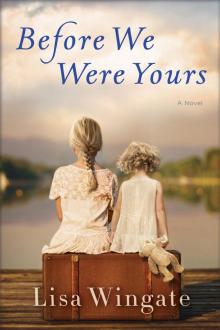 Before We Were Yours
Before We Were Yours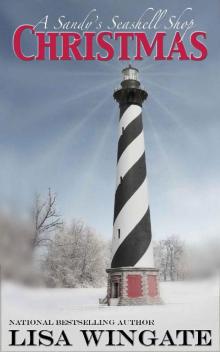 A Sandy’s Seashell Shop Christmas
A Sandy’s Seashell Shop Christmas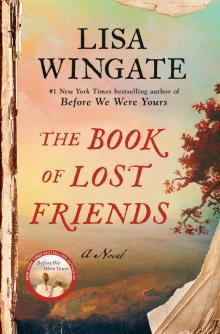 The Book of Lost Friends
The Book of Lost Friends Larkspur Cove
Larkspur Cove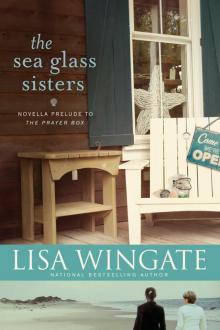 The Sea Glass Sisters
The Sea Glass Sisters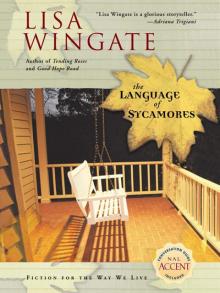 The Language of Sycamores
The Language of Sycamores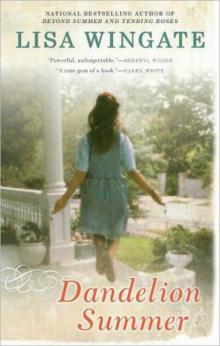 Dandelion Summer
Dandelion Summer Word Gets Around
Word Gets Around Beyond Summer
Beyond Summer Firefly Island
Firefly Island The Tidewater Sisters: Postlude to The Prayer Box
The Tidewater Sisters: Postlude to The Prayer Box Talk of the Town
Talk of the Town![Blue Sky Hill [01] A Month of Summer Read online](http://i1.bookreadfree.com/i1/03/29/blue_sky_hill_01_a_month_of_summer_preview.jpg) Blue Sky Hill [01] A Month of Summer
Blue Sky Hill [01] A Month of Summer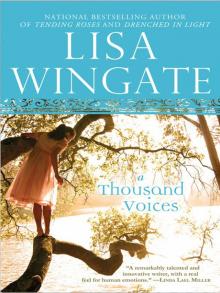 A Thousand Voices
A Thousand Voices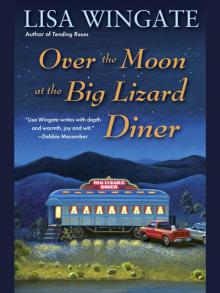 Over the Moon at the Big Lizard Diner
Over the Moon at the Big Lizard Diner Never Say Never
Never Say Never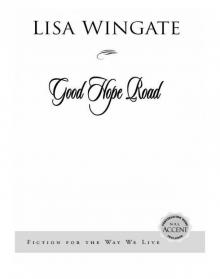 Good Hope Road
Good Hope Road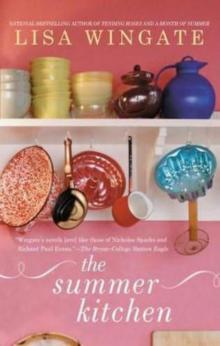 The Summer Kitchen
The Summer Kitchen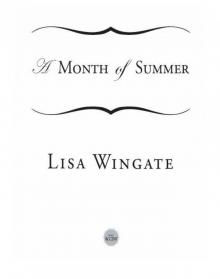 A Month of Summer
A Month of Summer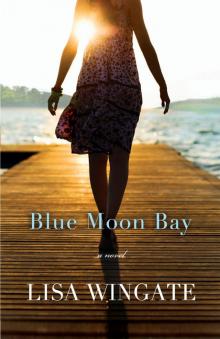 Blue Moon Bay
Blue Moon Bay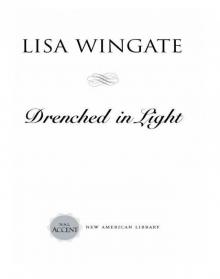 Drenched in Light
Drenched in Light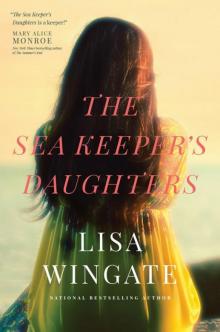 The Sea Keeper's Daughters
The Sea Keeper's Daughters